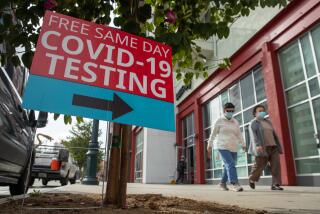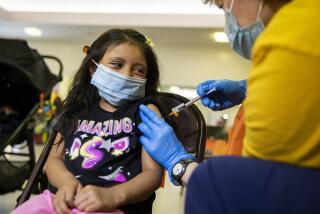Give Them Their Best Shots
All children need immunizations to protect them against diseases. Often, more than one vaccination is needed for each type of disease. The chart below gives a schedule for immunizations; your own child’s schedule may differ based on the doctor’s recommendations. For example, your doctor may advise that your child be tested for tuberculosis. In any case, your child should have the first set of immunizations finished by age 2.
For most children, immunizations pose little risk. However, if you have any concerns, be sure to discuss them with your child’s doctor. Always keep a current record of your child’s immunizations. That way if your child has missed any, you can let the doctor know and your child can catch up.
Source: Based on information provided by StayWell Co.
(BEGIN TEXT OF INFOBOX / INFOGRAPHIC)
Recommended Childhood Immunization Schedule
Approved by the Advisory Committee on Immunization Practices, the American Academy of Pediatrics and the American Academy of Family Physicians.
Hepatitis B
First Dose: Birth to 1 month
Dose 2: 1 month to 4 months
Dose 3: 6 months to 18 months
Catch-up*: 11-12 years
****
Diptheria, Tetanus, Pertussis
Dose 1, Dose 2, Dose 3: 2 months to 6 months
Dose 4: 15 to 18 months
Dose 5: 4-6 years
Tetanus and Diptheria booster: 11-12 years, 14-16 months
****
H. influenza type B
Dose 1, Dose 2: 2 months to 4 months
Dose 3**: 6 months
Dose 3/4: 12 months to 15 months
****
Polio
Dose 1, Dose 2: 2 months to 4 months
Dose 3: 6 months to 18 months
Dose 4: 4-6 years
****
Measles, Mumps, Rubella
Dose 1: 12 months to 15 months
Dose 2: 4-6 years, 11-12 years
****
Varicella***
Dose 1: 12 months to 18 months
Catch-up*: 11-12 years
Updates
Hepatitis B
Now required for entry into kindergarten or any licensed child care program. As of July 1, 1999, will be required for students entering or advancing to the seventh grade.
Pertussis (whooping cough)
So-called “acellular” vaccine may now be given for all five doses. Whole-cell vaccine previously given to infants was associated with serious side effects.
Polio
Oral vaccine, shot or a combination of the two now acceptable.
Measles
Second dose now required of all children entering kindergarten.
Varicella (chickenpox)
Licensed by the government in March 1995. One dose may be given any time after first birthday. For those 13 or older, two doses needed.
* Given to those not previously vaccinated.
** Third dose not needed if PedvaxHIB vaccine by Merck is used.
*** May be given any time after first birthday. Not required for school entry.
Sources: Centers for Disease Control and Prevention, American Academy of Pediatrics.






